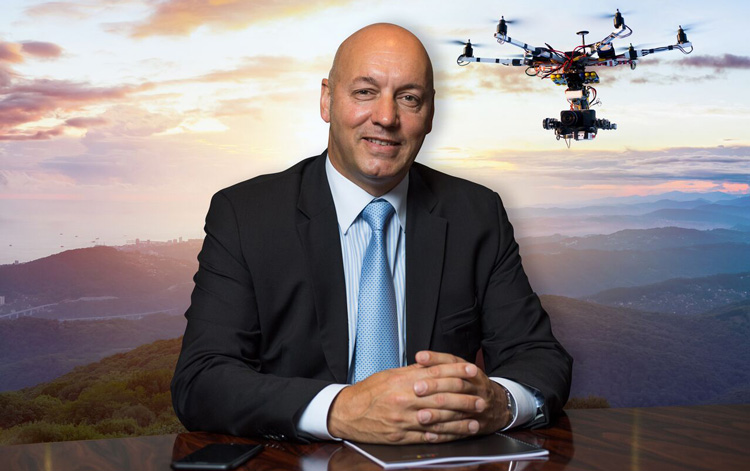The announcement was made at an event at the House of Lords last night sponsored by Field Marshal The Lord Guthrie of Craigiebank GCB, LVO, OBE, DL on behalf of the British Standards Institution (BSI) and Drone Major Group, whose founder and Chief Executive is Chairman of the BSI Committee responsible for Drone Standards.
The event was attended by BSI Chairman Sir David Brown, politicians including Aviation Minister Baroness Sugg, and other senior stakeholders in the drone industry, including manufacturers, users, service providers, economists, academics and media.
Sir David Brown commented: “BSI is playing a pivotal role in supporting the exciting global future for drones through its work on standards for Unmanned Aircraft Systems. Standards accelerate innovation, boost productivity and enable trade, while promoting safety and consumer protection.”
Robert Garbett, (pictured below) in his role as Chairman of the BSI Committee on Drone Standards, stated in a speech: “That after several years of work and global collaboration, detailed draft standards are expected to reach BSI Committee stage by Spring 2018, following which there will be a period of wider consultation, expected then to lead to adoption shortly thereafter.”

He commented: “The development and adoption of the first quality and safety standards for the drone industry will make 2018 a pivotal year for an industry which is set to become a global phenomenon. It is the year when British and world standards will be crystallised, energising the industry, and enabling it to meet its full potential to the benefit of UK plc, and indeed economies worldwide.
“Drones, empowered by Standards that can be trusted and relied upon are the key to many of our economic, transport, security, environmental and productivity challenges of today. They will open up new avenues to innovation that we can only begin to imagine!
“Two years ago drones were forecast to spawn a $100bn industry by 2020. But today the opportunities are perceived to be even greater than this since such projections were based upon available data at that time which predominantly focused on the air industry, and we define the entire drone industry as covering surface, underwater, air, and space. If you look at the entire picture the figures are much larger and growing faster than anyone expected. If you then forecast the impact of integrating drone technologies across these environments, the figures will take on an ever more exciting dimension.”
“Looking at our vision for the ‘direction of travel’ for the drone industry, key areas of growth include:
- In the transport industry… Drones are bringing new possibilities to freight and passenger transport on land, water and in the air, which will reduce the need for expensive infrastructure projects, reduce road traffic, ease congestion, save lives and reduce pollution in our cities.
In addition, this transport revolution will allow workers to live further outside the cities, reducing the pressure on housing and spreading wealth to the regions. In this single area alone, the benefits that drones bring are compelling.
In addition, with the recent UK Government announcement that we will have driverless cars on our roads by 2021, this reality is gaining momentum and will have a widespread positive impact on every one of us.
Whether you call them autonomous vehicles, surface drones or unmanned ground vehicles, full adoption of drone technology by the automotive industry will be the revolutionary step that the world is waiting for.
There are of course many challenges ahead, from the levels of intelligence required to make a passenger-carrying drone vehicle safe for use at speed, to the liability in the case of an accident. However the economic and safety arguments for the full adoption of passenger-carrying drone vehicles on our roads are overwhelming.
- In infrastructure and construction, drones are already significantly reducing the time and resources needed to plan and build our roads and buildings, making the progress faster, safer and much more cost effective. Indeed drones are shaping plans for new smart cities for which the use of these technologies will be part of the fabric of life.
- In agriculture, drones will use advanced scanning technology to detect crop disease before it is visible to the human eye and assist in the intelligent use of pesticides, thus dramatically reducing our exposure to them and increasing crop yields.
- In medicine, drones are already being trailed which are able to attend the scene of an accident within minutes to scan the area in 3D, feed this information to the emergency services to assist with access and pre-attendance assessment, and then land with medical supplies.
- In the marine environment, Remotely Operated Vehicles or Unmanned Underwater Vehicles have been used extensively in the inspection and repair of pipelines and oil rigs for many years. Indeed this sector is very well established in many respects as a standalone industry, and is often neglected when calculating the growth of the drone market. As the range of applications for drones in the marine environment expands into exploration, environmental monitoring and intervention, the value to the industry is rapidly increasing. This is definitely a sector to watch as technologies create opportunities for businesses and investors.
“There are many other examples from the use of drones in mining when new resources become available which were previously inaccessible; in defence as new technology enables us to meet threats without risking the lives of our soldiers, and in security of everything from oil pipelines to individuals and many more.
“The keys to growth for this exciting young industry are:
- First we need to educate the public on the positive impact that this technology will have on their lives, and not sow the kind of fear that preceded the introduction of the automobile which led to people having to walk in front of a car waving a red flag.
- We need investors to get behind the research and development which will enable the industry to break through the barriers it faces such as ‘operations beyond visual line of sight’, the integration of airspace, and the adoption of multi environment systems (from air to land to sea and beyond).
- And finally we need governments worldwide to stand firmly behind the drone industry to ensure that it is not choked by over regulation… thankfully something the UK Government has indicated it is keen to avoid… and to work together to find effective ways to promote responsible use, without stifling a great new sector which has the potential to make such an important contribution to the wellbeing of people and businesses throughout the world.”
“The potential for the drone industry worldwide is huge, and particularly for the UK economy where the combination of our intellectual capital – our technology, engineering, innovation, governance, and above all, our development and support of high standards – is world class.”







